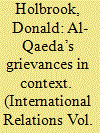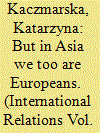|
|
|
Sort Order |
|
|
|
Items / Page
|
|
|
|
|
|
|
| Srl | Item |
| 1 |
ID:
151000


|
|
|
|
|
| Summary/Abstract |
At a time when political debate in the West is preoccupied with the perceived impact of extremist ideas on individuals who embrace or support terrorism, this article uses the publicly articulated grievances of Ayman al-Zawahiri, Al-Qaeda’s most prolific ideologue, as a case study to examine how a globally focused and distributed extremist narrative matches political realities on the ground. The approach of the article is to compare two political processes: the approach of Islamist extremists, as represented by Zawahiri, to constitutional reform as articulated through public appeals to potential supporters versus the reality of constitutional amendments and evolution of fundamental law in the Middle East and South Asia. Incorporating insights from studies on law and society and International Relations, the article demonstrates how Zawahiri’s interpretation of religious law emphasises wholesale adoption of sharia while the process of legal reform has invariably resulted in the creation of legal hybrids, mixing Islamic and non-Islamic legal traditions. This is not an article about theology or religious law but an effort to dissect the public relations of an international terrorist movement. The analysis pays particular attention to events in Zawahiri’s native Egypt, where evolving grievances concerning a series of constitutional amendments – including those following the Arab revolutions and the toppling of Mohammed Morsi – are assessed.
|
|
|
|
|
|
|
|
|
|
|
|
|
|
|
|
| 2 |
ID:
150998


|
|
|
|
|
| Summary/Abstract |
The standard of civilisation served Western states to hierarchically organise international politics and reproduce Western pre-eminence. Russia, depending on the historical period, has been interpreted as either an ardent follower or a major challenger to Western projects, but it has been markedly absent from debates regarding the standard. This article proposes to engage Russia in the standard of civilisation discussion with reference to the standard’s two most considered expositions: the colonial-era ‘original’ and what the literature interprets as the standard’s contemporary revival. In order to do so, I trace Russia’s nineteenth-century colonial practices and analyse Russia’s selected policies towards post-Soviet states in the post–Cold War period. On the basis of these explorations, I argue that Russia’s application of the standard of civilisation goes beyond the mere reproduction of hierarchical arrangements between an imagined centre and peripheries. The practices of the standard of civilisation have been employed to improve Russia’s desired, and imagined, status in international politics – that of a great power equal to the West. From that it follows that the concept of the standard of civilisation should be recognised as ordering relations not only of the strong and the weak but also of those in position of power in international politics.
|
|
|
|
|
|
|
|
|
|
|
|
|
|
|
|
| 3 |
ID:
150999


|
|
|
|
|
| Summary/Abstract |
What are the attitudes towards the European Union (EU), the United States, Russia and Japan among Chinese urban citizens, and how can we explain these attitudes? These are the intriguing questions that we want to answer in this article. The image, social identity, trust, and political socialization theories proposed the various explanatory variables. We assessed their explanatory powers by analysing survey data from more than 2000 Chinese urban citizens. Most empirical evidence is found for the image theory: positive perceptions of the people (trustworthy and peaceful) and the bilateral relationship (friendly) clearly contribute to positive attitudes.
|
|
|
|
|
|
|
|
|
|
|
|
|
|
|
|
| 4 |
ID:
150997


|
|
|
|
|
| Summary/Abstract |
The contentious concept of ‘lawfare’ has proliferated to various foreign policy areas and permeated a discourse on the function and legitimacy of law in conflict. The concept seems particularly apt to the International Criminal Court’s (ICC) judicial interventions. In this context, I define lawfare as the coercive and strategic element of international criminal justice in which the ICC’s judicial interventions are used as a tool of lawfare for States Parties and the United Nations Security Council to pursue political ends. I argue that there are two types of political ends being pursued with this lawfare: conflict resolution and politicized prosecutions. First, the ICC’s spokespersons, advocates, and supporting states have cultivated a discourse that justice is a means to peace. As a result, the ICC has been used as a means of intervention in ongoing conflicts with the expectation that the indictments, arrests, and trials of elite perpetrators have deterrence and preventive effects for atrocity crimes. Despite these legitimate intentions and great expectations, there is little evidence of the efficacy of justice as a means to peace. Second, the other manifestation of lawfare represents an abuse or manipulation of the ICC for political gain. Specifically, States Parties have strategically referred their conflict situations to the ICC with the expectation that the referral will result in the removal of their rivals and sanction the impunity of ruling elites. This politicization of international justice has been successful in that most of the ICC’s prosecutions are unjustly one sided. Evidence of politicized prosecutions has damaged the ICC’s credibility as an impartial institution and raises questions about the desirability of state referrals. Consequently, the ICC’s efficacy and credibility are suffering from lawfare.
|
|
|
|
|
|
|
|
|
|
|
|
|
|
|
|
| 5 |
ID:
151001


|
|
|
|
|
| Summary/Abstract |
Securitization theory seeks to explain the politics through which (1) the security character of public problems is established, (2) the social commitments resulting from the collective acceptance that a phenomenon is a threat are fixed and (3) the possibility of a particular policy is created. In the last decade, research on securitization has grown significantly. The aim of this article is to evaluate the achievements of securitization theory. First, its main concepts and premises are critically discussed. This article then proceeds to examine the empirical applications of securitization theory to a broad range of issues, as well as the theoretical implications of these studies. Finally, it discusses the main challenges faced by securitization scholars and puts forward strategies to overcome them. This article develops three inter-related arguments. First, notably thanks to empirical studies, securitization theory has significantly developed beyond its initial focus on the speech act. Second, as a result, the distinctiveness of securitization theory currently lies in its capacity to articulate a specific approach to security – influenced by the speech act – with an ‘analytics of government’, which emphasizes practices and processes. Third, securitization theory faces three types of challenges, related, respectively, to theory, method and methodology. The capacity of scholars to overcome those will strongly influence the extent to which securitization theory will be able to make significant contributions to the debates in Security Studies and International Relations in the years to come.
|
|
|
|
|
|
|
|
|
|
|
|
|
|
|
|
|
|
|
|
|